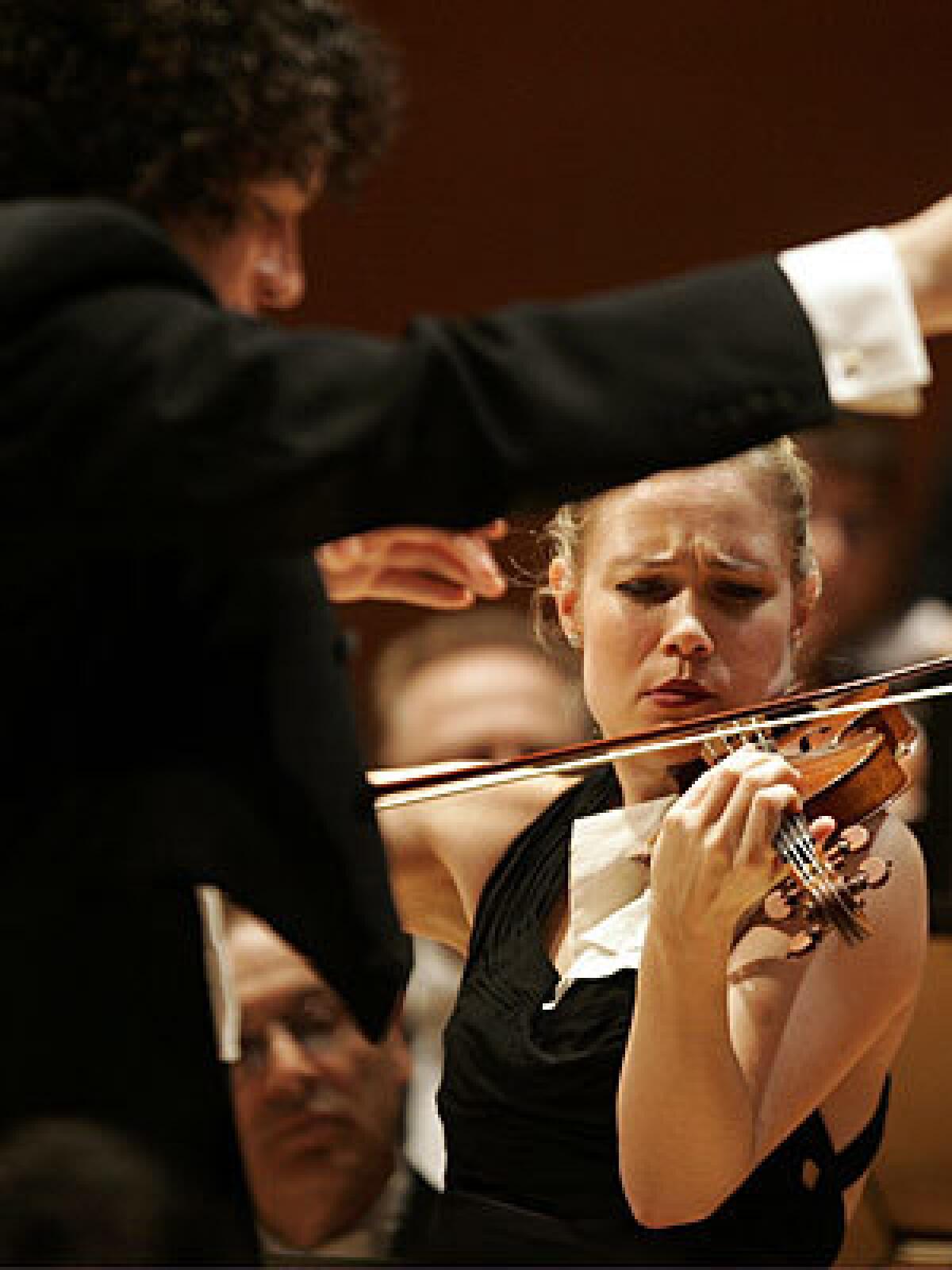Live: L.A. Philharmonic

The affair between Gustavo Dudamel and Los Angeles is young love. Thursday night at Walt Disney Concert Hall, the 27-year-old Venezuelan who will become music director of the Los Angeles Philharmonic in 2009 led a demanding program of two key 20th century works: Bartók’s Violin Concerto No. 2 and Ravel’s “Daphnis and Chloe.” Had he wished to go to less trouble, he probably could have drawn a crowd conducting the Thomas Guide. Bigwigs rarely seen at Disney were there.
The affair between Dudamel and the musicians is also young love. He has been by all accounts rehearsing them tirelessly, but this, the second of his current two weeks with the Philharmonic, was only Dudamel’s fourth program with them. Orchestra musicians take professional pride in their stony faces, in not showing how they feel about any given maestro, at least while they play. But a couple hundred sparkling eyes have blown that cover.
Still, young love, however engulfing, is often little more than an awakening, the love of love. The beginning of a chemical reaction is interesting, but we want to know more.
So of greater fascination, right now, is the love affair between Dudamel and music. That’s been brewing for a while, yet he still exudes a boyish exuberance that makes a listener feel that this maestro is falling in love with the notes on the page as they are played. The combination of his astonished freshness and complete command of his material is, of course, a turn-on.
There were, though, an awful lot of notes for him to fall in love with Thursday. Dudamel was as impressive and winning as ever, but he also reminded us that young love can be blind. He began at the dawn of the 20th century with Debussy’s “Prelude to the Afternoon of a Faun,” written in 1894. It was a slow, seductive, sensual performance of music that was, for its time, shockingly seductive and sensual. But not necessarily so slow.
Dudamel expends energy on everything. The lissome flute melody at the start levitated. Willowy string tremolos fluttered in the wind. A magical atmosphere was created -- but not by magic. One could clearly see Dudamel pulling the strings, often with great effort, and he kept pulling and pulling, wanting ever more, wanting to make each delicate effect last and last.
The performance was irresistible. Still, a little less might have meant a little more.
A late bloomer
Leila Josefowicz was the soloist in the Bartók. Unlike Dudamel, she grew up among us, an Angeleno and a prodigy who had an impressive record contract and international solo engagements while still in her teens.
Even so, she has been a late bloomer. Now 30, she has outgrown a banal adolescent romanticism and become a violinist femme fatale. I say that with admiration, since, for all her sex-kittenish, rock ‘n’ roll posturing, she impressively brought out the danger in what is arguably Bartók’s most profound and disturbing concerto.
Written in the late ‘30s, when the world as the Hungarian composer knew it was falling to pieces, the concerto searches through the impending ruins of country and culture for a future. Bartók hangs on to the past and his love for folk music, but he applies advanced modernist techniques as a defense mechanism.
Josefowicz’s natural tone is slender, and her technique is athletic. Like Dudamel, she burns calories freely onstage. She is changeable. She delivers alluring Bartókian melodies like a siren, but she can turn tigress in a split second -- hence the sense of danger.
On this occasion, she didn’t seem to channel Bartók, exactly, nor force herself on him either. The impression she gave was more like catching his spirit, in all its surprising complexity, and then running with it.
Although the orchestra is not insignificant in this score, Dudamel remained in the background, usefully feeding her lines.
To be reckoned with
In “Daphnis,” Dudamel once more revealed himself as a force of nature. He must have worked very hard to achieve an all but inaudible opening from the low strings, producing the effect of the music mysteriously coming from nowhere.
Much of the performance, which also featured the Pacific Chorale, was ravishing. Dudamel was a sleight-of-hand artist with Ravel’s diaphanous dissolves. Day broke in glorious splendor. The Bacchantes danced with fabulous frenzy. At the end, Dudamel appeared elated and worn. As did the orchestra. As did the audience.
Dudamel’s reserves of energy never fail to electrify everything they come in contact with. But easy as it was to love, this was also, at times, an overblown “Daphnis.” Dudamel has internalized an hourlong score and lives it, exhausting moment by moment. As with “Faun,” a Salonen or a Boulez can do more in this music with less. But he has time to learn about conservation. Right now, it’s springtime, young love is in the air, this is magnificent music and Disney Hall’s wildflowers are in full, rapturous bloom.
More to Read
The biggest entertainment stories
Get our big stories about Hollywood, film, television, music, arts, culture and more right in your inbox as soon as they publish.
You may occasionally receive promotional content from the Los Angeles Times.











